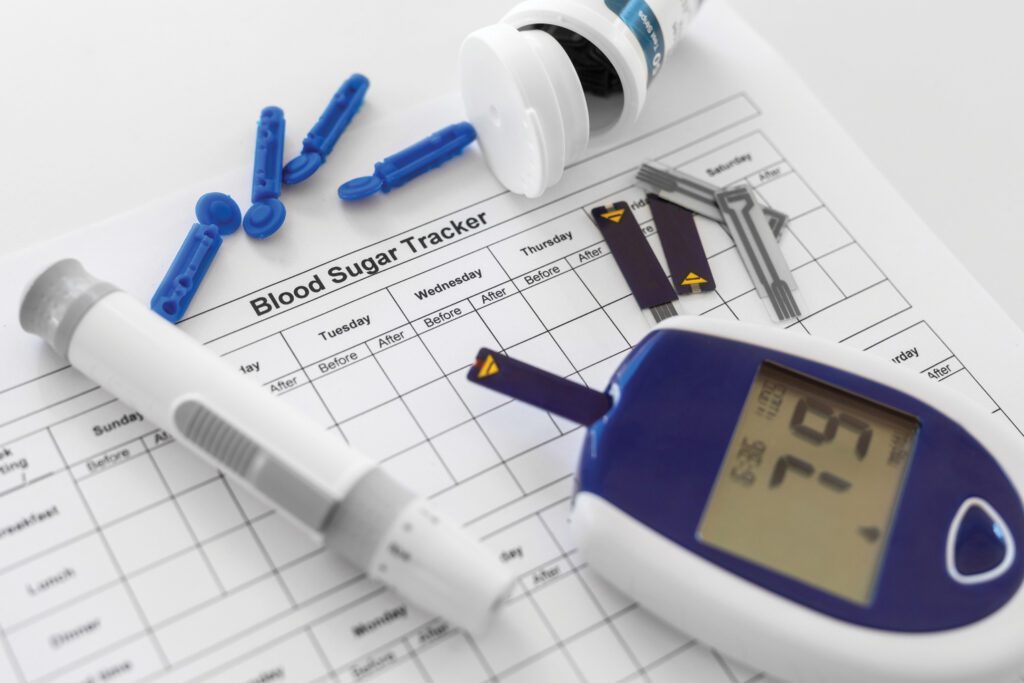For the 1.5 million Americans diagnosed with diabetes every year, lofty promises of lifestyle changes can be hard to keep. By breaking goals into manageable steps, successes can be easier to reach, and frustrations more easily avoided. Here’s how to develop a strategy that works.
Managing diabetes can seem like a full-time job: you need to monitor blood sugar, take medications on time, stay in touch with physicians, eat healthy, exercise… and lower your stress. The commitments you make to change your habits and get healthy can quickly seem impossible. Using a system called SMART goal setting, however, can keep these big jobs from being so overwhelming.

The SMART strategy helps break down diabetes management into goals that are Specific, Measurable, Achievable, Relevant, and Time-bound – leaving you proud of your progress rather than disappointed you couldn’t keep up.
What is Diabetes?
Per Brooke Green, a nurse practitioner, certified diabetes educator, and advanced diabetes manager with Hamilton Physician Group, “Diabetes is a metabolic disorder characterized by either lack of insulin production or inability to use insulin effectively.” If your body isn’t making or using enough insulin to move glucose to your cells, it accumulates in the blood and puts you at risk for serious health complications. According to the most recent National Diabetes Statistics Report published by the Centers for Disease Control and Prevention (CDC), 23.1 million adults ages 18 and up in the United States have been diagnosed with diabetes, and the report suggests another 7.2 million remain undiagnosed.
Type 1 diabetes is an autoimmune disorder in which your immune system works against you, destroying the cells in the pancreas that produce insulin. In turn, your body cannot produce insulin or transfer glucose from the blood into the cells at all. Green shares, “Type 1 diabetes, formerly known as juvenile diabetes, often occurs in younger individuals but may also occur at any age.” Completely unpreventable, type 1 diabetes can be recognized by extreme thirst, vision changes, frequent urination, and weight loss.
The Prediabetes Problem
An alarming 1 in 3 adults have prediabetes. In adults age 65 and older, nearly half have prediabetes. According to Dr. Kinsey, “Prediabetes is often without signs, but some symptoms that may be associated with it include: constant hunger, unexplained weight loss or weight gain, flu-like weakness and fatigue, blurred vision, slow wound healing, numbness or tingling in the hands or feet, skin or dental infections that are recurring, recurring vaginal or bladder infections, and/or a high BMI.” Regular visits to your physician can help you identify problems before they become advanced.
Type 2 diabetes, which is largely preventable, accounts for 90-95% of diagnoses. A type 2 diabetic is insulin-resistant, which means the body does not use insulin as it should. At first, the pancreas tries to compensate by producing even more, but eventually it cannot keep up. Dr. Katrina Gooden, a family medicine physician with Galen Medical Group, notes, “Symptoms of Type 2 diabetes can be very vague and develop over many years. In fact, most people with Type 2 diabetes are believed to have problems for 10 years prior to diagnosis. If a patient has symptoms, they include fatigue, increased thirst or urination, increased hunger, blurred vision, numbness or tingling in the feet, slow-healing wounds, and weight changes.”
Risk Factors and Outcomes Associated with Diabetes
While type 1 diabetes is an autoimmune disease and not brought on by lifestyle choices, Dr. Victoria Kinsey, a physician with CHI Memorial Primary Care Associates in Cleveland, states that “the single most important risk factor for type 2 diabetes is obesity, because obesity leads to insulin resistance.” Other risk factors include being 45 or older, having a family history of the disease, being physically active less than three times a week, or having had gestational diabetes (high blood sugar during pregnancy). Race and ethnicity can serve as risk factors as well, as can chronic stress. Smokers are 30-40% more likely to develop type 2 diabetes than nonsmokers.


The CDC reports that diabetes is the seventh leading cause of death in the United States and the leading cause of kidney failure, lower-limb amputations, and adult-onset blindness. Diabetics are 40% more likely to suffer from glaucoma, which can pinch blood vessels that lead to the optic nerve and retina, resulting in gradual vision loss. They are also twice as likely to have heart disease or a stroke. Dr. Gooden explains, “The better blood sugars are controlled over time, even with a diabetes diagnosis, the easier it is to prevent or minimize these issues. Your doctor will order specific tests or refer you for special screening to monitor your risks for these diseases. They will also discuss what additional changes you can make to decrease your risk for diabetes-related complications.”
The SMART Way
Setting and sticking to goals for diabetes management can be a daily struggle. The truth is, setting a goal to simply be more active, take medication on time, or eat healthier is too broad. “SMART is an acronym that stands for Specific, Measurable, Achievable, Relevant, and Time-bound. It provides an easy-to-use guideline to set goals,” says Green. SMART goal setting allows you to take a larger goal and break it down into smaller steps toward success, so a healthier lifestyle is within reach.
Specific
The declarations I will exercise more or even I will take walks a few times a week communicate intention but do not set you up for action. Instead, take out your calendar and pen a more specific plan: On Mondays, Wednesdays, and Fridays, I will take the first 30 minutes of my lunch break to eat and the second 30 minutes of my lunch break to walk.
Measurable
Thirty to 45 grams of carbohydrates at breakfast is a reasonable goal for a person managing diabetes. Physicians recommend those carbs be consumed in the form of whole grains, fruit, and low-fat dairy – not refined grains like pancakes or white bread. The goal I will eat fewer carbohydrates is not specific or measurable. Instead, consider I will limit my carbohydrates at breakfast to 45 grams. Now you can pre-plan a list of breakfast options that meet this goal so you aren’t left guessing. For example: half a cup of cooked oatmeal with one cup of strawberries and one cup of low-fat milk. Or, one boiled egg, two pieces of whole grain toast, and one serving of sugar-free yogurt.
Achievable
Make sure you have the data, the resources, and the physical ability to reach your goal. To better prevent and respond to unhealthy blood glucose levels, you will need a blood glucose monitor and a journal to log numbers and notes about the activities and foods that preceded a reading. With the proper tools, an achievable goal would be, I will measure my blood glucose after every two hours and watch for patterns in activity and diet that need to be discussed with my doctor.
Relevant
How is your specific goal (fewer carbs) relevant to your overarching goal (lower blood sugar)? By limiting your carbs to 45 grams with meals, you will be more likely to add protein to your meal, which will leave you feeling less hungry and more satisfied while controlling your blood glucose levels.
Time-Bound
Do not commit to a specific lifestyle change for the complete foreseeable future, or even for the rest of the year. “Setting a short period of time, say two weeks, to focus on your specific goal will help you decide at the end of the period if the goal works for you or if you need to set a different goal,” says Dr. Kinsey.
“Being diagnosed with diabetes can be very overwhelming for a patient. It’s hard to learn there is something wrong with your body, and all the changes in diet and monitoring can be a lot to take on. Fortunately, setting reasonable goals for patients can make them feel confident in the management of their disease. Diabetes offers many opportunities for goal setting, including dietary changes, regular exercise, weight loss, and regular monitoring and screening with their doctor,” says Dr. Gooden. So if you’re suffering from diabetes, it’s time to get SMART!


Brooke Green
Nurse Practitioner, Certified Diabetes Educator, and Advanced Diabetes Manager, Hamilton Physician Group


Dr. Victoria Kinsey
Physician, CHI Memorial Primary Care Associates – Cleveland


Dr. Katrina Gooden
Family Medicine Physician, Galen Medical Group

